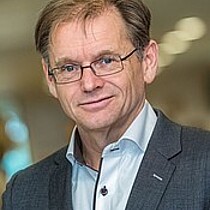

Article: Saturday, 1 February 2014
The economic crisis shows remarkable parallels to a personal crisis in its characteristics and consequences. If that is the case, does this imply that solutions should also run parallel? For sure, such crises provide corporate leaders with many new demands.
According to psychologists a ‘midlife crisis’ can be recognised by creeping feelings of dissatisfaction and
ineffectiveness, a lacking in creativity and enthusiasm, coupled with boredom and a confused search for adventure and inspiration. Typically it is something that comes as a complete surprise to the individual, although may be long anticipated by family, friends and co-workers alike.
Personal recession can become a full-blown crisis if feelings of stress lead to burnout. Writer Joseph Campbell characterised it thus: “Midlife is when you reach the top of the ladder and find that it was against the wrong wall.” Unfortunately, a real midlife crisis is an existential one for which no quick fixes are possible. The confusion can only be solved by sense-making, the process by which we are able to give meaning to our experiences. At such times many people often consult life coaches.
The same is essentially true for the present economic crisis; identified as a systems crisis for which new approaches to management and regulation are necessary. According to economist Joseph Stiglitz, many independent observers saw the crisis coming. The only question was ‘when?’ Paradoxically, one of the contributing factors to the crisis has been the very search for adventure and ‘risk’ undertaken by corporate leaders – combined with a decreased ability and willingness of governments to regulate speculative behaviour.
In this sense, the psychological cause for the economic turmoil can be attributed to a collective midlife crisis of top executives. The economic crisis created a sense of uncertainty, triggered by its complexity. Some managers are still in a state of denial, but on the whole most societies recognise that they face a challenge for which ‘business as usual’ no longer suffices.
Consequently, the lack of sense-making and vision at an organisational level is strongly felt. A substantial number of public companies in the Netherlands do not have an official mission statement. Large American companies such as General Electric have denied the relevance of a detailed mission statement, other than an expressed desire to ‘be number one’ in each of their market segments.
In times of crisis this attitude is particularly problematic. Research with Dutch public companies has shown that those with a societal vision do better during economic downturns than organisations without. One explanation is that visionary corporate leaders have it easier in asking employees to show their loyalty to the company, for instance by accepting wage cuts or working longer hours.
Also, more focused corporations find it simpler to stick to their core competencies and even increase R&D investments during times of crisis which gives them a head start in the reconstruction period. Companies without a clear mission improvise and go for short-term solutions – the sale of valuable assets, perhaps – which deprives them of longer-term directions for sustained recovery.
Sense-making, therefore, becomes a condition for organisational as well as personal ‘growth’. Nowadays this sense-making includes a vision on sustainability and corporate responsibilities. This has been acknowledged by Jack Welch, former CEO of General Electric and Fortune magazine’s ‘Manager of the Century’, who had refuted its relevance years before. Welch qualifies the ambition of high share prices as a ‘dump idea’.
The biggest challenge in times of organisational crisis is the lack of openness towards critical reflection, leading to herding behaviour. This is the phenomenon also known as ‘group think’. The involvement of outsiders, such as executive coaches, can help overcoming these problems in which the challenge is one of double sense-making: to be successful it must be tackled at an individual as well as an organisational level.
Dealing with parallel crises requires a new corporate leadership style, which has alternately been defined as ‘servant’, ‘integrative’ or ‘sacrificing’ leadership. Such leaders put the interest of the organisation before their own and try to manage complexity by creating a vision of the future that can mobilise the largest number of employees in their organisation.
Our research with Dutch organ-isations identified three trade-offs of styles for effective leadership in times of crisis: visionary-pragmatic; participative-directive; person oriented-result oriented. Major causes of the crisis were attributed to overly pragmatic/directive/result oriented leadership styles. The solution to the crisis, however, is not to move to the other extreme (visionary/participative/ person-oriented) but to strike a balance between these opposite styles. Directive leadership and visionary
leadership proved to be mutually exclusive styles in the Netherlands. There is great potential for Dutch executives to deal with the initial paradoxes of the crisis, although it could be argued whether executives are able to not only present a vision, but also make it meaningful and practical. A nascent conflict between person-oriented and result-oriented leaders therefore exists.
Our research sketches ten steps and the pro-active attitude needed to seize the opportunity of the parallel crises:
Get a good executive coach to support parallel change trajectories.
Wake-up: the (individual and organisational) stress test; no active change without corporate and self-awareness of the seriousness of the problem.
Honest communication supported by, for instance, Life Styles Inventory techniques should help determine whether real and perceived (by employees) leadership styles are one and the same
Brainstorming and dreaming: in most organisations there is a sizable gap between what people want and what they do, so dreaming about optimal solutions helps in triggering change paths.
Sense-making: redefinition of organisational and personal mission creates focus in the brainstorming process.
Self-acceptance and deepening of organisational identity: without this, ambitions might unrealistically be set too low or too high.
Implementation strategy: make your ambitions simple, measurable, achievable, realistic and time-bound.
Walk the talk: but with integrity and an open ear for feedback.
Check for balance with other activities: work-life balance; psychic-physical; internal-external stakeholders.
Personal and organisational change trajectories along this sequence create what is sometimes referred to as ‘stability under dynamic change’. This is particularly appropriate for organisations in crisis.

This article is based on the findings of a research project that is the result of extensive cooperation between KPMG and RSM. It is part of a longer-term project on skills development for leaders in complex organisational challenges, such as cross sector partnerships. One project has resulted in a book: ‘Leadership and Coaching in Times of Crisis’ (www.erim.nl/scope).
This deals with the conditions under which executive coaching is useful and found to offer a substantial return on investment for leaders. The research was based on a representative survey amongst 163 executives in the Netherlands, partly formatted as a replication of a 2001 study in order to facilitate comparison over time.
This article was published in RSM Insight 03. More information about and back copies of RSM Insight can be found here.


Science Communication and Media Officer

Corporate Communications & PR Manager
Rotterdam School of Management, Erasmus University (RSM) is one of Europe’s top-ranked business schools. RSM provides ground-breaking research and education furthering excellence in all aspects of management and is based in the international port city of Rotterdam – a vital nexus of business, logistics and trade. RSM’s primary focus is on developing business leaders with international careers who can become a force for positive change by carrying their innovative mindset into a sustainable future. Our first-class range of bachelor, master, MBA, PhD and executive programmes encourage them to become to become critical, creative, caring and collaborative thinkers and doers.
